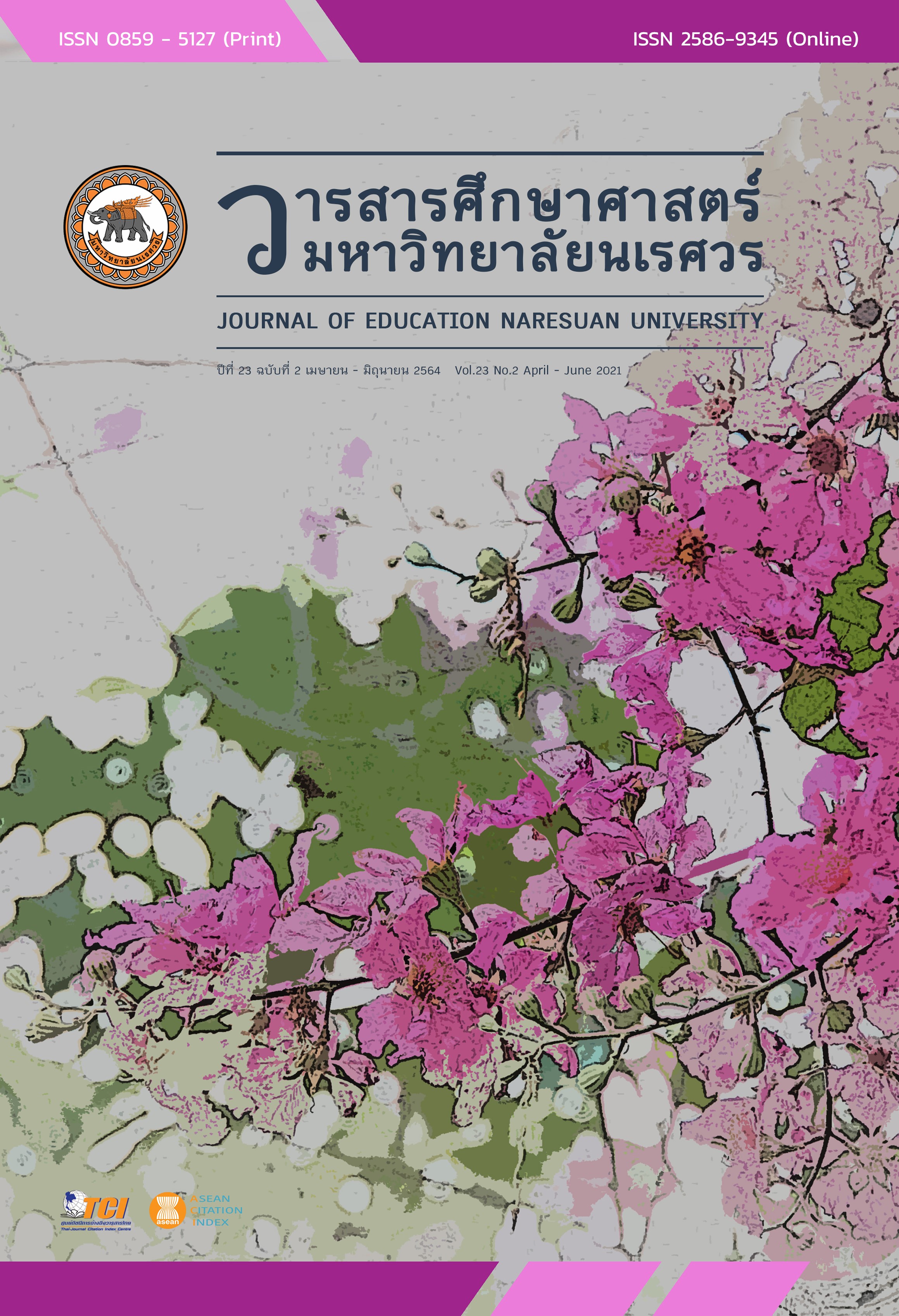การรับรู้เกี่ยวกับความรู้ในเนื้อหาผนวกวิธีสอนสะเต็มศึกษาของครูวิทยาศาสตร์ SCIENCE TEACHERS’ PERCEPTIONS ON PEDAGOGICAL CONTENT KNOWLEDGE FOR STEM
Main Article Content
บทคัดย่อ
งานวิจัยนี้มีวัตถุประสงค์เพื่อศึกษาการรับรู้เกี่ยวกับความรู้ในเนื้อหาผนวกวิธีสอนสะเต็มศึกษาของครูวิทยาศาสตร์ที่มีประสบการณ์การสอนตามแนวทางสะเต็มศึกษามาแล้ว ซึ่งอยู่ในเขตภาคใต้ตอนบน คือ จังหวัดชุมพร ระนอง กระบี่ และสุราษฎร์ธานี จำนวน 106 โรงเรียน โดยใช้แบบสอบถามวัดการรับรู้ของครูวิทยาศาสตร์เกี่ยวกับความรู้ในเนื้อหาผนวกวิธีสอนสะเต็มศึกษาและการสัมภาษณ์กึ่งโครงสร้าง โดยใช้เหตุการณ์จำลองจากคลิปวีดีโอการสอนสะเต็มศึกษา จากนั้นวิเคราะห์ข้อมูลโดยใช้สถิติพื้นฐานในการหาค่าความถี่ ร้อยละ จากแบบสอบถาม และใช้กระบวนทัศน์การตีความจากการสัมภาษณ์ ผลการวิจัย พบว่า ในภาพรวมของครูวิทยาศาสตร์มีการรับรู้เกี่ยวกับความรู้ในเนื้อหาผนวกวิธีสอนสะเต็มศึกษาอยู่ในระดับดี โดยเฉพาะอย่างยิ่งครูวิทยาศาสตร์มีการรับรู้เกี่ยวกับความเข้าใจสะเต็มศึกษาของผู้เรียนเป็นไปในทิศทางที่ดีกว่าองค์ประกอบอื่น แต่เมื่อพิจารณาลงไปในรายละเอียดขององค์ประกอบแต่ละด้านแล้วพบว่าครูวิทยาศาสตร์มีการรับรู้ที่ไม่ชัดเจนและคลาดเคลื่อนในบางประเด็นเกี่ยวกับการสอนสะเต็มศึกษา ได้แก่ ธรรมชาติของเนื้อหาวิชาในสะเต็มศึกษา ความยากง่ายของเนื้อหาในกิจกรรม การสืบค้นข้อมูลโดยใช้เทคโนโลยีขั้นสูง กระบวนการคิดเชิงวิศวกรรมและผลลัพธ์ของการเรียนรู้สะเต็มศึกษา
Article Details
เจ้าของบทความมิได้คัดลอก หรือละเมิดลิขสิทธิ์ของผู้ใด หากเกิดการละเมิดลิขสิทธิ์ ไม่ว่าวิธีใด หรือการฟ้องร้องไม่ว่ากรณีใด ๆ ที่อาจเกิดขึ้นได้ กองบรรณาธิการวารสารศึกษาศาสตร์ ไม่มีส่วนเกี่ยวข้องทั้งสิ้น ให้เป็นสิทธิ์ของเจ้าของบทความที่จะดำเนินการ
เอกสารอ้างอิง
Baxter, J. A., & Lederman, N. G. (1999). Assessment and measurement of pedagogical content knowledge. In J. Gess-Newsome and N. G. Lederman (Eds.), Examining Pedagogical Content Knowledge. (pp. 147-161). Dordrecht, Netherlands: Kluwer Academic.
Breiner, J. M., Harkness, S. S., Johnson, C. C., & Koehler, C. M. (2012). What is STEM? A discussion about conceptions of STEM in education and partnerships. School Science and Mathematics, 112(1), 3-11.
Brown, R., Brown, J., Reardon, K., & Merrill, C. (2011). Understanding STEM: Current perceptions. Technology and Engineering Teacher, 70(6), 5-9.
Bybee, R. W. (2010). Advancing STEM education: A 2020 vision. Technology and Engineering Teacher, 70(1), 30.
Chamrat, S. (2016). STEM education on the road of socially-engaged scholarship: Game changer for future learning. Kaseatsart Educational Review, 31(3), 34-47. [in Thai]
Chunlen, N. (2014). Inquiry is messing. IPST Magazine, 42(186), 6-9. [in Thai]
EL-Deghaidy, H., Mansour, N., Alzaghibi, M., & Alhammad, K. (2017). Context of STEM integration in schools: Views from in-service science teachers. EURASIA Journal of Mathematics, Science & Technology Education, 13(6), 2459-2484.
Faikhamta, C., Coll, R. K., & Roadrangka, V. (2009). The development of Thai pre-service chemistry teachers’ pedagogical content knowledge: From a methods course to field experience. Journal of Science and Mathematics Education in Southeast Asia, 32(1), 18-35.
Feldman, A. (2000). Decision making in the practical domain: a model of practical conceptual change. Science Education, 84(5), 606–623.
Freeman, S., Eddy, S. L., McDonough, M., Smith, M. K., Okoroafor, N., Jordt, H., & Wenderoth, M. P. (2014). Active learning increases student performance in science, engineering, and mathematics. Proceedings of the National Academy of Sciences, 111(23), 8410-8415.
Hart, S. M., & Bennett, S. M. (2013). Disciplinary literacy pedagogy development of STEM preservice teachers. Teacher Education and Practice, 26(2), 221-242.
Hume, A., & Berry, A. (2011). Constructing CoRes: A strategy for building PCK in pre-service science teacher education. Research in Science Education, 41(3), 341-355.
Karahan, E., Canbazoglu Bilici, S., & Unal, A. (2015). Integration of media design processes in science, technology, engineering, and mathematics (STEM) education. Eurasian Journal of Educational Research, 60, 221-240. Doi: 10.14689/ejer.2015.60.15
Kelley, T. R., & Knowles, J. G. (2016). A conceptual framework for integrated STEM education. International Journal of STEM Education, 3, 11. https://doi.org/10.1186/s40594-016-0046-z
Kijkuakul, S. (2015). STEM education. Journal of Educational Naresuan University, 17(2), 201-207. [in Thai]
Lertdechapat, K., & Faikhamta, C. (2018). Science and engineering practices in a revised Thai science curriculum. Proceedings of the 6th International Conference for Science Educators and Teachers. Bangkok, Thailand.
Magnusson, S., Krajcik, J., & Borko, H. (1999). Nature, sources and development of pedagogical content knowledge for science teaching. In J. Gess-Newsome & N. G. Lederman (Eds.), Examining pedagogical content knowledge: The construct and its implica-tions for science education (pp. 95-132). Dordrecht, The Netherlands: Kluwer Academic.
Marks, R. (1990). Pedagogical content knowledge: From a mathematical case to a modified conception. Journal of teacher education, 41(3), 3-11.
National Research Council (NRC). (2012). A framework for K-12 science education: Practices, crosscutting concept, and core ideas. Committee on New Science Education Standards, Board on Science Education, Division of Behavioral and Social Science and Education. Washington, DC: National Academy Press.
Ortiz, A. M., Bos, B., & Smith, S. (2015). The power of educational robotics as an integrated STEM learning experience in teacher preparation programs. Journal of College Science Teaching, 44(5), 42-47.
Park, S., & Oliver, J. (2008). Revisiting the conceptualisation of pedagogical content knowledge (PCK): PCK as a conceptual tool to understand teachers as professionals. Research in Science Education, 38, 261-284. 10.1007/s11165-007-9049-6.
Saxton, E., Burns, R., Holveck, S., Kelley, S., Prince, D., Rigelman, N., & Skinner, E. A. (2014). A common measurement system for K-12 STEM education: Adopting an educational evaluation methodology that elevates theoretical foundations and systems thinking. Studies in Educational Evaluation, 40, 18-35.
Shulman, L. (1987). Knowledge and teaching: Foundations of the new reform. Harvard educational review, 57(1), 1-23.
Siripattarachai, P. (2013). STEM education and 21st century skills development. Executive Journal, 33(2), 49-56. [in Thai]
Srikoom, W., Hanuscin, D. L., & Faikhamta, C. (2017). Perceptions of in-service teachers toward teaching STEM in Thailand. Asia-Pacific Forum on Science Learning and Teaching, 18(2), 1-23. Retrieved from https://www.eduhk.hk/apfslt/v18_issue2/srikoom/index.htm
Srikoom, V. (2018). Enhancing secondary science teachers’ pedagogical content knowledge for teaching stem through practice and research-base professional development program (Doctoral dissertation). Bangkok: Kasetsart University.
The Institute for the Promotion of Teaching Science and Technology. (2014). STEM education strategy. Retrieved from https://www.stemedthailand.org/ [in Thai]
Vichaidit, C., & Faichamta, C. (2017). Exploring orientations toward STEM education of pre-service science teachers. Rajabhat Maha Sarakham University Journal, 11(3), 165-174. [in Thai]
Wang, H. H., Moore, T. J., Roehrig, G. H., & Park, M. S. (2011). STEM integration: Teacher perceptions and practice. Journal of Pre-College Engineering Education Research (J-PEER), 1(2), Article 2. https://doi.org/10.5703/1288284314636
Wilson, S. M. (2011). Effective STEM teacher preparation, induction, and professional development. Retrieved from https://sites.nationalacademies.org/cs/groups/dbassesite/documents/webpage/dbasse_072640.pdf


